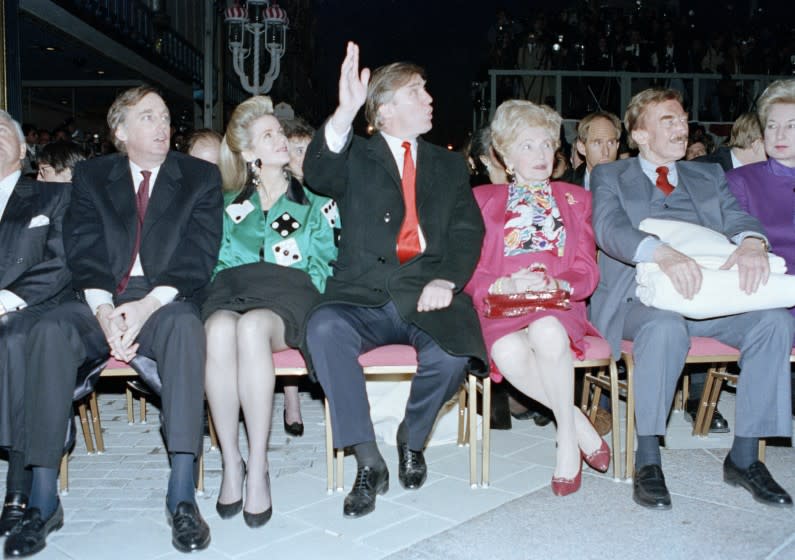Column: Horror clouds every page of Mary Trump's book about her Uncle Donald

Mary Trump’s book about her Uncle Donald is dark. Right from the get-go, when it begins with this feel-good epigraph from “Les Miserables”: If the soul is left in darkness, sins will be committed.
Already notorious, “Too Much and Never Enough” is Donald Trump’s story, written by his niece, a clinical psychologist and Trump family dissident. It's being released this month after a failed effort, nominally by Donald’s brother Robert, to get a court to stop its publication.
You can see why President Trump doesn’t want anyone to read this thing. It gives the lie to many of his most cherished myths about himself, including the howler that he’s self-made.
According to the book, Uncle Donald’s ineptitude goes so deep it’s hard to fathom. Mary reports that one of his sisters, casting around for something to give Donald credit for, proposed his five bankruptcies.
That kind of revelation produces a snicker from a reader like me, but that’s all that passes for levity here. Horror clouds every page. I expected to encounter some seamy stuff in any history of the Trump family’s fortune. After all, the money comes from brothels, tax evasion, bankrupt casinos, sketchy real-estate deals and a more or less stolen election.
But I also expected at least a little gritty urban romance. If not the sumptuous passions of “The Godfather,” the Trump saga would — I hoped — contain a moment or two of “Sopranos”-style wit.
Nothing doing.
The president’s life story is narrow, provincial and grim — a joyless grind of fraud and cruelty evoked not by the gruesome glitz of Trump Tower but by the dreary Trump apartment Mary lived in as a child with her mother and father, Linda and Freddy Trump. Sloppily installed air conditioners rotted the drywall, and no amount of plastic sheeting could keep out the bitter wind; Trump Management, run by Freddy’s father Fred and brother Donald, refused to fix it.
As a piece of writing, Mary Trump’s book is less investigative exposé than gruesome family memoir. Typically, barbarous families who land in memoirs barely scrape by, feeding the kids cat food and festering in the shadows. The barbarous Trump family, by contrast, runs the free world, feeds the kids gold and festers under klieg lights.
By now, you’ve probably encountered the bullet-pointed morsels from “Too Much and Never Enough,” especially the claim that Donald paid someone to take his SATs for him. These are mini-bombshells consistent with what the world knows of Trump. “Working the refs, lying, cheating” — this is how the Trump empire operates, Mary Trump writes. Likewise, the Trump White House and the president himself.
But even if Trump’s cheating on the SAT is not exactly shocking, it’s nonetheless satisfying to confirm what we guessed all along: The president never acquired baseline competence in math or vocabulary. (Seriously, try to picture him confronting even one polynomial. Trump working through coefficients and variables — he could sooner walk down a ramp.)
What’s most intriguing about Mary Trump’s book is not juicy revelations but its thesis: her idea that the Trumps were so deceitful and corrupt that growing up among them meant growing up “institutionalized,” stuck in an m.o. that cripples a person emotionally and cognitively every bit as much as a prison would.
And from his adolescence in reform school to his dotage in the Oval Office, as Mary writes, Donald has also been literally “institutionalized most of his adult life.” The chief hallmarks of that institutionalization were deceit and unearned trophies: “Honest work was never demanded of him, and no matter how badly he failed, he was rewarded in ways that are almost unfathomable.”
On election night 2016, Mary Trump, who had supported Hillary Clinton for president, says she was traumatized. She waited and then watched as her uncle was set loose “to turn this country into a macro version of my malignantly dysfunctional family.”
At the heart of that dysfunction, Mary contends, is relentless and incongruous puffery of Donald. First, Trump, though fundamentally infantile and mentally unwell, styled himself a stable genius, all evidence to the contrary. Then his father backed him up. Then the media spread the hype. Finally, and most crucially, banks fell for it.
As Mary elegantly puts it, “Their willingness (and then their need) to foster his increasingly unfounded claims to success hung on the hopes of recouping their losses.”
That dynamic could apply equally to Trump’s enablers, dependents and supporters.
“Too Much and Never Enough” isn’t a gossipfest. It isn’t “rollicking.” It’s a bleak story, and there’s no redemption. The country, like Donald Trump’s creditors, will not recoup its losses.
In the end, Mary Trump stays true to the despair she felt on election night. She manages not to qualify it or wish it away. Refusing to flinch from the darkness of Trump’s story is no small accomplishment. We should all be so brave.

